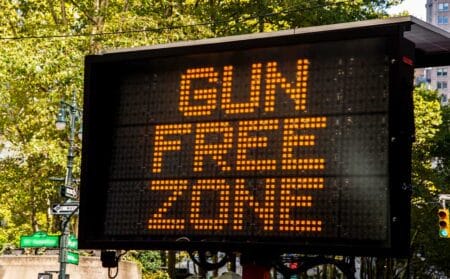
On July 18, 2025, the Delaware State Sportsmen’s Association and the Bridgeville Rifle and Pistol Club sued the Delaware Department of Safety and the Delaware Superintendent of State Police. The lawsuit challenged a law passed in 2022, which made the possession and purchase of certain firearms by anyone between the ages of 18 and 21 illegal.
The lawsuit was heard in the Superior Court for the State of Delaware by Judge Reneta L. Green-Streett. On August 29, 2025, Judge Green-Streett granted the plaintiffs Motion for Summary Judgement and denied the Defendants’ Cross-Motion for Summary Judgement.
In this opinion, 18–20 year olds are held to have full rights to keep and bear arms protected by Delaware’s Constitution, Article I, Section 20.
Delaware Constitution, Section 20
§ 20. Right to keep and bear arms
A person has the right to keep and bear arms for the defense of self, family, home and State, and for hunting and recreational use.
Delaware added state protection of the right to keep and bear arms in 1987. Before that, the Delaware state constitution did not have a right to keep and bear arms section. Before 1970, there were 14 states that did not have a right to keep and bear arms provision in their state constitutions. As the push to infringe on rights protected by the Second Amendment accelerated with the federal Gun Control Act of 1968, groups supporting the right to keep and bear arms pushed to place protections in state constitutions and strengthen those which already existed. Today, there are only five states that have no state constitutional protections for the right to keep and bear arms.
In the opinion by Judge Green-Streett, she notes that the Delaware Supreme Court upheld Section 20 in 2017. The opinion by Judge Green-Streett is based on the state Constitution and the Delaware Supreme Court precedent. From the opinion:
Third, although federal jurisprudence surrounding the Second Amendment may prove persuasive, this Court’s analysis must be based on the Delaware Supreme Court’s interpretation of the Delaware Constitution. Taken together, along with the axiomatic concept that this Court must follow Delaware Supreme Court’s decisional law regarding Delaware statutory and constitutional law until the Delaware Supreme Court issues new guidance, this Court will apply the test described in Bridgeville to determine if HB 451 violates Section 20.
Judge Green-Streett declined to use the Federal standards set forth by the United States Supreme Court. She held that “the Delaware provision is intentionally broader than the Second Amendment and protects the right to bear arms outside the home, including hunting and recreation.”
Judge Green-Streett found that the exercise of a constitutionally protected right cannot be reliant on a discretionary licensing procedure. From the opinion:
The concealed carry statute’s plain text conveys the process is discretionary. The exercise of a constitutionally-protected right cannot be reliant on a discretionary licensing procedure. That premise particularly applies where, as is the case with an application for a concealed carry permit, an applicant who receives a denial has no appellate options. An 18-to-20-year-old applying for a concealed carry permit, after fulfilling all requirements, may be denied without any recourse to have her constitutional right to possess a firearm for self-defense restored to her.
Judge Green-Streett concluded that the provisions of HB451, which infringe on a subsection of adults, are unenforceable. From the conclusion of the opinion:
Article I, Section 20 of the Delaware Constitution enshrined the right of citizens to “keep and bear arms for the defense of self, family, home and State, and for hunting and recreational use.” At a minimum, some provisions of HB 451 infringe on the right of a subsection of adults, aged eighteen to twenty, to exercise their right to “defense of self, family, home and State.” Accordingly, those provisions violate the Delaware Constitution and are unenforceable. HB 451’s provisions that do not affect the rights of 18-to-20-year-olds – such as those outlining the rehabilitative services offered to those under the age of eighteen – remain intact. Plaintiffs’ Motion for Summary Judgment is GRANTED, and Defendants’ Cross- Motion for Summary Judgment is DENIED.
IT IS SO ORDERED.
The right to keep and bear arms in Delaware was protected by far-seeing citizens who pushed for and obtained Section 20 of the Delaware State Constitution in 1987. Constitutional protections depend on honest judges to enforce them.
State constitutions, as with the United States Constitution, depend on people with the will to hold officials accountable in a representative republic.
California’s Carry Restrictions Crumble—Judge Sides with Gun Rights
Tennessee Court Finds 2 Laws Unconstitutional Under Second Amendment
About Dean Weingarten:
Dean Weingarten has been a peace officer, a military officer, was on the University of Wisconsin Pistol Team for four years, and was first certified to teach firearms safety in 1973. He taught the Arizona concealed carry course for fifteen years until the goal of Constitutional Carry was attained. He has degrees in meteorology and mining engineering, and retired from the Department of Defense after a 30 year career in Army Research, Development, Testing, and Evaluation.







I would not have suspected this in Delaware. One, that they have a constitution supporting the 2nd Amendment. Two, that they would allow that in their courtrooms.
Good for them. Maybe we can get more authorities to read now.
HLB